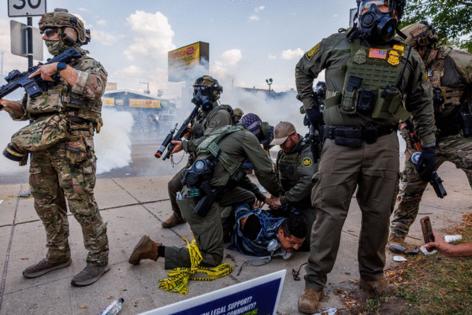Chicago appeals court halts order restricting use of force by immigration agents, calling it 'overbroad'
Published in News & Features
CHICAGO — A Chicago federal appeals court on Wednesday put the brakes on a lower court’s preliminary injunction restricting the use of force in Operation Midway Blitz, saying it is “overbroad” and improperly targets virtually the entire executive branch, including President Donald Trump.
In agreeing to issue a stay, however, the 7th U.S. Circuit Court of Appeals warned to “not overread” the order, saying the findings by U.S. District Judge Sara Ellis “may support entry of a more tailored and appropriate preliminary injunction” down the line.
Ellis’ preliminary injunction, issued two weeks ago, prohibits immigration agents from deploying tear gas or other munitions before issuing two explicit warnings, requires agents in the field to have body cameras and wear clear identification on their uniforms and forbids law enforcement from targeting journalists or interrupting their news gathering in most circumstances.
Unlike a temporary restraining order Ellis issued on Oct. 9, the preliminary injunction was to remain in effect until a final decision on the merits of the case is made, either at trial or through a settlement.
Last week, Ellis set a trial on a permanent injunction for early March.
In asking the 7th Circuit for an emergency stay, lawyers for the U.S. Department of Justice wrote that the case was a “perfect example” of a growing trend in the nation’s courts to issue sweeping injunctions that violate the separation of powers and “superintend law-enforcement activities under threat of contempt.”
“The predictable result is to broadly obstruct the enforcement of the nation’s laws, chill the exercise of executive power, and subvert the constitutional structure,” the 22-page filing stated.
The filing also alleged the injunction is “unworkable in practice” and illegally transforms her into a “supervisory tribunal” for deciding whether federal officers were acting lawfully in their day-to-day operations.
In its two-page order Wednesday, the appeals court said a stay was warranted because government attorneys were likely to succeed in those arguments.
“The preliminary injunction entered by the district court is overbroad,” the order said. “In no uncertain terms, the district court’s order enjoins an expansive range of defendants, including the President of the United States, the entire Departments of Homeland Security and Justice, and anyone acting in concert with them. … The practical effect is to enjoin all law enforcement officers within the Executive Branch.”
Ellis’ injunction also requires to submit all future guidelines for use of force to the court for review, “a mandate impermissibly infringing on principles of separation of powers on this record,” the appeals court said.
The injunction was also too “prescriptive” in barring the “use of scores of riot control weapons and other devices in a way that resembles a federal regulation,” the appellate court order said.
Ellis issued the injunction after a marathon day of evidence that featured the sworn videotaped deposition of Border Patrol Cmdr. Gregory Bovino, the tough-talking face of the Trump administration’s immigration enforcement push, as well as live testimony from more than half a dozen witnesses who said immigration agents pointed guns at citizens and threatened to arrest protesters who were doing nothing more than recording the agents’ activities on the street.
In her ruling, Ellis said top government officials lied in their testimony about threats that protesters posed and that their unlawful behavior on the streets “shows no signs of stopping.”
“I find the government’s evidence to be simply not credible,” Ellis said, describing a litany of incidents over the past month and a half in which citizens were tear-gassed “indiscriminately,” beaten and tackled by agents and struck in the face with pepper-spray balls. “The use of force shocks the conscience,” Ellis said.
The judge noted in particular that Bovino lied repeatedly in his deposition testimony about the force that his agents and he himself personally inflicted in incidents across the Chicago area.
“In one of the videos, Bovino obviously attacks and tackles the declarant, Mr. Blackburn, to the ground,” Ellis said about Scott Blackburn, who was protesting outside the Immigration and Customs Enforcement facility in west suburban Broadview. “But Mr. Bovino, despite watching this video (in his deposition) says that he never used force.”
____
©2025 Chicago Tribune. Visit at chicagotribune.com. Distributed by Tribune Content Agency, LLC.







Comments